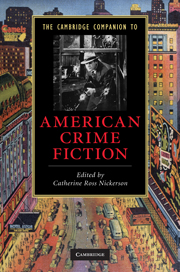Book contents
- Frontmatter
- 1 Introduction: The satisfactions of murder
- 2 Early American crime writing
- 3 Poe and the origins of detective fiction
- 4 Women writers before 1960
- 5 The hard-boiled novel
- 6 The American roman noir
- 7 Teenage detectives and teenage delinquents
- 8 American spy fiction
- 9 The police procedural in literature and on television
- 10 Mafia stories and the American gangster
- 11 True crime
- 12 Race and American crime fiction
- 13 Feminist crime fiction
- 14 Crime in postmodernist fiction
- Guide to reading
- Index
12 - Race and American crime fiction
Published online by Cambridge University Press: 28 September 2010
- Frontmatter
- 1 Introduction: The satisfactions of murder
- 2 Early American crime writing
- 3 Poe and the origins of detective fiction
- 4 Women writers before 1960
- 5 The hard-boiled novel
- 6 The American roman noir
- 7 Teenage detectives and teenage delinquents
- 8 American spy fiction
- 9 The police procedural in literature and on television
- 10 Mafia stories and the American gangster
- 11 True crime
- 12 Race and American crime fiction
- 13 Feminist crime fiction
- 14 Crime in postmodernist fiction
- Guide to reading
- Index
Summary
Race is ubiquitous and powerful in American crime fiction, as central in the genre as it is in American society; however, in fiction as in life, race matters are frequently denied, displaced, or otherwise so thoroughly disguised that many readers overlook them. Despite the tremendous expansion of serious critical interest in popular fiction generally and in crime fiction in particular during the final decades of the twentieth century and the first decade of the twenty-first, few critics have examined the workings of race in crime fiction, with most critical attention to race limited to examining texts by writers of color with detectives of color. While such analyses have been helpful to the larger critical project of comprehensively mapping the genre, limiting discussion of race to texts in which race is directly addressed and in which the race at issue is not white serves to disguise further the actual roles of race in American crime fiction. Whiteness - its boundaries, its value, its meanings and perceived threats to its dominance - has been a primary concern of crime fiction throughout its history in the US.
Although even sketchily tracing the evolution of American crime fiction is beyond the scope of this essay, it is worth remembering that crime fiction grew out of mass fascination with true crime narratives and that in the US the popular appetite for crime stories was fed partly by newspapers' crime reporting, especially their police report columns.
- Type
- Chapter
- Information
- The Cambridge Companion to American Crime Fiction , pp. 135 - 147Publisher: Cambridge University PressPrint publication year: 2010
- 3
- Cited by



